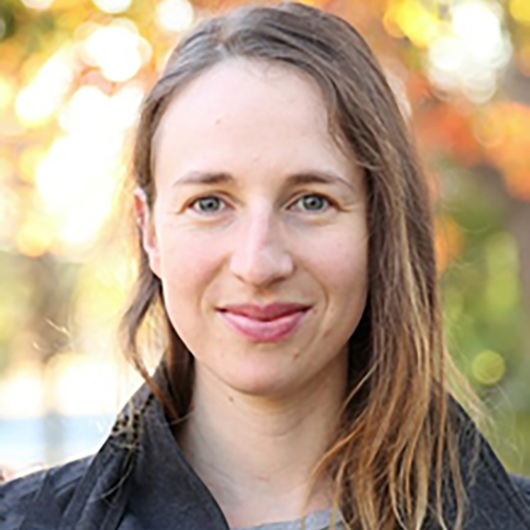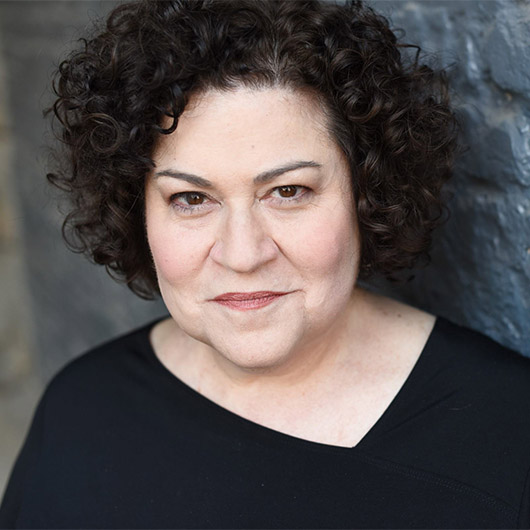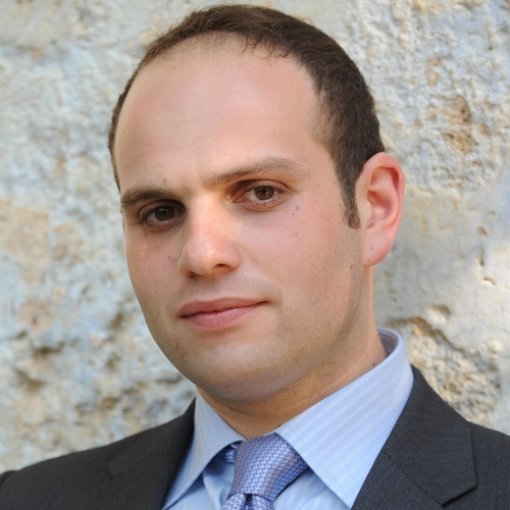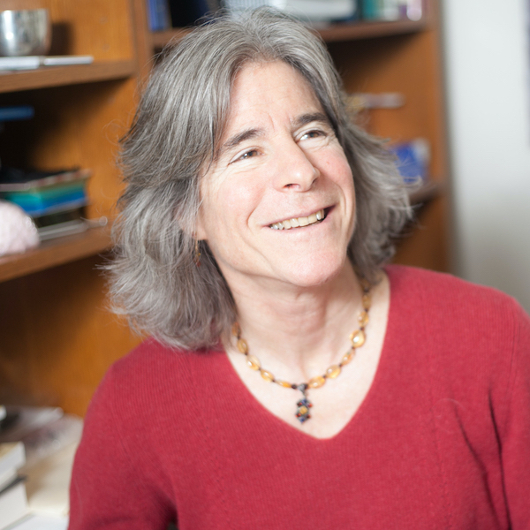Galbut Outstanding Faculty Award
Presented to a faculty member who has been outstanding in teaching and in efforts to engage students both inside and outside the classroom; selected from outstanding faculty members nominated by School of Communication students; established by the Galbut family
Ariel Stess

Ariel Stess is a playwright, director, and an assistant professor of instruction in the Department of Radio/Television/Film.
“I owe it to Professor Stess for being one of the most influential people I have had the pleasure of taking class from at Northwestern,” said one student, “and instilling in me that it is more than possible to achieve my dreams in the entertainment industry.”
Warm, helpful, wildly creative, and always dependable, Ariel is an educator that students find themselves gravitating toward again and again.
“Thanks to Professor Stess’ continued mentorship I grew tremendously as both a student and writer,” said one student. “She is an engaging professor who shows a deep interest in the learning experience and well-being of her students.”
Ariel takes the time and energy to accommodate her students and encourage them to take risks.
“My confidence and ability as a writer has grown so much through taking multiple writing classes with Ariel,” said a student. “I even found myself submitting previous scripts to film festivals this season, something I never imagined that I would be doing.”
In short, students are better off in their career journeys because of her.
“I know that one day, when my golden writers room opportunity comes,” one said, “I will be prepared to seize it and make the most of it all thanks to Professor Ariel Stess.”
Clarence Simon Awards for Outstanding Teaching and Mentoring
Annually recognizes outstanding School of Communication teachers and mentors—one in each of the school’s three divisions (division I, theatre and performance studies; division II, radio/ television/film and communication studies; and division III, communication sciences and disorders)— based on nominations by students and faculty; honors Clarence Simon, who served the school as an outstanding teacher and administrator for many years
(Division I)
Cindy Gold

Professor Cindy Gold has been a transformative, guiding, and inspiring force in the theatre department for the last 26 years. She has mentored countless students through the acting sequence and dazzled innumerable others in her classes. Said one student, “She taught me to be proud of who I am and the art I put forward.”
With kindness, empathy, and grit, she coaxes the best out of her students: “As I struggled early on in the acting sequence, Cindy made a point of making herself available outside of class to work individually with me and my peers on monologues, scenes, and just to simply chat about our work and our lives.”
Students and faculty alike rave about her rapport with actors of all levels and her pride in their work, regardless of their choice to pursue careers in acting.
“Cindy is the kind of teacher that every young person needs,” said one alum. “She understands how uncertain and self-conscious students can be when they first arrive at Northwestern, and she gives them the space to grow into who they are, not who they think they should be. She is the kind of teacher who cares about your development, and more than that, your happiness.”
A successful working actor in her own right, she shares her real-world knowledge and connections with students and “is a true master teacher and is profoundly generous with all she knows, has done, and is,” said one grad student.
“She creates spaces that are crackling with inspiration and warm with trust and collaboration and does so with minimal artifice or force,” the student continues.
Cindy will be sorely missed, as this marks her last year teaching.
(Division II)
Nathan Walter

Communication Studies Assistant Professor Nathan Walter’s work centers on messaging and disinformation in health communication. His students boast of a knowledgeable, dynamic, and approachable educator who fosters inclusivity in his classrooms.
“Student success is dependent in part on the extent to which a learning environment is supportive, encouraging, and validating,” said one student. “Nathan’s ability to facilitate such an environment—be it in the classroom, in his office, over Zoom, or over coffee—is truly exceptional. His commitment to meeting students where they are enables learning, intellectual growth, and, perhaps most importantly, fellowship.”
While pandemic-era Zoom classes were challenging for all, “he managed to turn a three-hour call into a vibrant seminar through engaging lectures and collaborative in-class activities. His Socratic approach to facilitating class discussions encourages students to take intellectual risks that they might otherwise avoid,” said another student.
A doctoral candidate witnessed “Nathan’s ability to create a classroom environment in which every student feels safe, comfortable, and confident—all without comprising academic rigor.”
Students reported deep understanding of course content, thanks to Nathan’s work, and prompt and thoughtful responses to questions and requests.
“There is no other way to describe him than ‘standout,’” said one student. “It’s uncommon to find a professional as consistent, interesting, and open as Nathan Walter.”
(Division III)
Nina Kraus

Nina Kraus is a professor of neurobiology and otolaryngology in the Roxelyn and Richard Pepper Department of Communication Sciences and Disorders, where she also holds the position of Hugh Knowles Chair.
“As celebrated as she is in the field of neurobiology, Dr. Kraus maintains the heart of a humble, keen learner,” said one student.
Her classrooms are safe, supportive, and full of healthy, boisterous discussion. Nina takes the time to get to know each of her students—which must be a challenge in some of her larger classes—and relates to them in a way that resonates.
“One of my favorite things about Dr. Kraus is that she recognizes that her students come to the class with different background knowledge as well as with different career goals,” said one doctoral candidate. “She embraces this diversity and makes each student feel like they can contribute something to class no matter what stage they are in or what their background is.”
Students talk of the unique way she is able to foster belonging in classes that are often made up of undergraduates, master’s students, and doctoral candidates. She encourages all to share their thoughts and experiences with other another to help each student develop and grow.
“Dr. Kraus is a humble, reflective, kind and genuine person,” said one student. “She takes initiative in being a role model who is not afraid to seek help, and sincerely hopes that her students are taking away as much as they can from the class.”
